

 |
 |
||||
| Home | Reviews | Extras | Forums |
|
A Place Further Than The UniverseSynopsisMari Tamaki is a curious, but ultimately cautious teenage girl. Just as she decides to make the most out of her high school years, she happens upon an envelope with a million yen (nearly 7210 US dollars) and a name on it. Tracking down the owner, Shirase Kobuchizawa, Mari is fascinated by the intensity of the girl and her desire to go to Antarctica, and decides to join her on her trip. The two eventually start making plans on how to muscle in on an already planned expedition team, and eventually pick up more friends in the process. ReviewStig: I have seen my share of shows starring teenagers -- that's about 99% of anime output, it would seem -- but few shows really capture that particular brand of energy, impertinence and stupidity that is a teenage speciality. A Place Further Than The Universe really is unique in a world of "girls doing stuff together" shows, so despite my grumpycat complaints that will definitely pepper this review further down, I really love this show. Allen: The key here is Mari's desire to "go on a journey without a plan." It's a wish-fulfillment for both Mari and the audience, as she stumbles into quite an adventure with Shirase and the other two girls who end up accompanying them. My personal favorite character was actually one Hinata Miyake, maybe largely because she didn't seem to be an integral part of the plot's machinery: Mari is the Point of View character; Shirase is the Instigator and Sustainer of the effort; and the fourth girl, Yuzuki Shiraishi, becomes a large part of the Means to the End. Since Hinata was not one of the critical cogs of the plot, I felt she had to make it here on her own personality, which is consistently upbeat (even when she's hurting inside.) 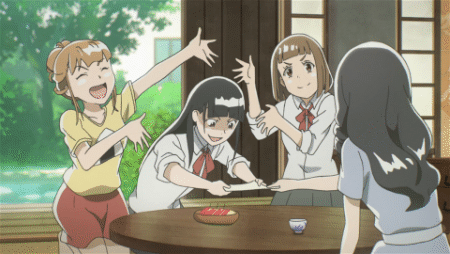 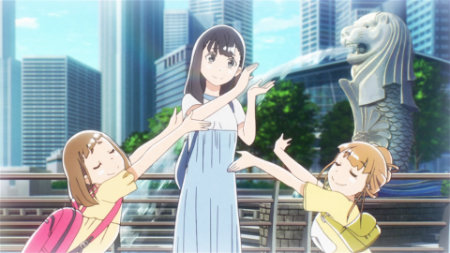 Stig: With Madhouse at the animation helmsman's (woman's?) wheel, you know you're in for a treat. This is doubly important when your end goal is Antarctica, but that doesn't mean it'll be easy getting there. Every single step of the way is portrayed with the kind of accuracy you don't often see, and that's not even getting started on the sheer animated energy Madhouse brings to the table, including but not limited to a certain running scene in episode 2. Everything about this show is about setting the mood, from the safe familiarity of school (if you're not considered an outsider), the various cities and their local delicacies or even the gorgeous, but hostile enviroment of Antarctica and the ocean you have to cross to get there. Allen: I found the girls' Australian encounter with Durians interesting, considering what I'd read about them- namely, that they're a totally repulsive fruit. I can see why they might be used as a punishment... Stig: Shirase is, in her own words, a bit of a jerk. Mari might be the first character introduced, but it's Shirase's journey that becomes the bond that ties our four main protagonist together. Her desire to go to Antarctica is mainly to see what her mother saw, and apparently was willing to risk death for, but it's also bolstered by a strong desire to throw her impending success in the face of all the people who gave her grief over it. Allen: Shirase has these odd hot-and-cold moments: hot (= frequently overbearing) when she's advocating for being allowed on the trip, but she gets serious cold feet (and not just from Antarctic temperatures!) when she has to speak in public. I was a little puzzled over why she seemed sure the trip would give her closure. Stig: My take on this is that Shirase has a very particular introverted personality, which doesn't always have to mean "wilting, shy flower who would rather die than talk to people". There is a stark difference in getting to know a single person and slowly loosening up around them to suddenly having to get (and endure) the attention of a large group of people. This might be in part why her personality is so prickly, though the years of negative attention (mostly from her schoolmates) after her mother's death probably also didn't help. It's to the show's benefit that her dream is also not an easy one. You do not simply walk into the inhospitable areas of the southern pole on a whim, and it goes without saying that we aren't getting there by episode two. Or even three. To wit, Shirase's first plan of action is to localize a crew that's actually going there, and attempting to seduce one of them to convince him to let them be stowaways, and it takes a special kind of optimism to even think that's a good idea. Granted, the crew she's aiming for is lead by Gin Todo, a woman who worked together with Shirase's mother in their first expedition to Antarctica, and as such, someone Shirase actually knows. The fact that Gin returned from her expedition while Takako, Shirase's mother, didn't, definitely complicates their relationship. Gin suffers from survivor's guilt, never mind over the woman whose daughter she was asked to look after, but it's also the reason why she feels compelled to continue their dream while also trying to keep her daughter safe. This is also why she makes for the unsung hero of this piece, even if the show makes right by her and her work. Allen: The story really required quite a few Lucky Breaks (and Improbable Coincidences) to get where it wanted to go, but making it an uphill battle, with the girls having to persevere in the face of some major setbacks, pumps up the drama. The hard parts here are not necessarily so much at the destination as during the journey. Shirase's presence on the trip is also a constant reminder to Gin of the one that was lost, and she wonders if (and how much) Shirase blames her personally for what happened. Stig: Shirase's motivations really is a field covered in mist, and this is partially because she herself probably doesn't fully knows what drives her. We don't have to wait long to see that Shirase does indeed care for her mother, and now that she won't ever see her again, that's a vacated spot in her heart. She might even have resented her mom a little for being away so often and for so long, leaving her alone.  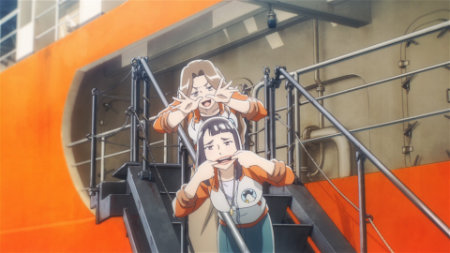 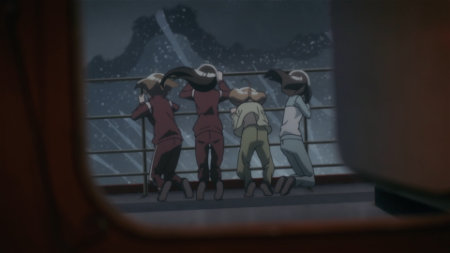 As much as I call Shirase (and the others) idiots for some of the things they do, it's not like she bought a rowing boat, winter clothing and whatever amount of food she thought she needed to get there and back again. She fully understand she needs Gin's help to get there, and her mother's death is the clearest sign on how dangerous it is. This is not to say that the girls don't do stupid things. The more notable one is when Hinata notices she doesn't have her passport that she absolutely needs for the flight, and she decides to hide this fact from her friends until the last possible moment, where the four girls, of course, go into panic mode. The issue is, of course, resolved, which is what leads to the aforementioned Durian incident, which is about as amusing as it is informative of the kind of person Yuzuki is. Then again, the worst case scenario for that would be that Hinata would have to cancel her part in all of this, which -- while bad -- isn't quite on the same level as when our quartet of idiots decides to go to open the door to the ship deck in the middle of the ocean during a storm! No, they didn't go out on the actual deck, but it's still an incredibly dangerous thing to do. It's one of the things the show seemingly decides to be all inspirational about, and it's one of the bouts of idiocy that would partially be on the actual adults, who should at least have taught them some basic safety tips, or at the very least made sure they were instructed about things absolutely positively not to do during an ocean trip. The main reason why Shirase don't know if she should resent Gin or not is probably because she realized how closely the two women's passions aligned, and Takako herself pushed Gin and Shirase to get to know each other at the earliest opportunity. Oddly enough, Takako herself has a ridiculously outgoing personality from what little we get to see of her, while Gin is more of a woman of few words. In that sense, Shirase is very much like her. Compared to the four main girls, Gin really is the unsung hero of this piece, as she's the one who holds her team together and allows them to continue working for the benefit of their trip of science and discovery, all on a shoestring budget in a line of work that absolutely positively doesn't allow for her to be cheap in the budget for equipment and training. She's also a woman who knows that even when you account for everything that can go wrong, sometimes tragedy happens anyway. Shirase might be on her journey of learning and finding closure, but her reuniting with her mother wasn't ever going to happen. Allen: The show even does this marvelous thing with Yuzuki. Her experience with others is as a media celebrity, and she doesn't even know what friendship IS; she thinks it must be something like contracts. She has to learn what it actually entails by her personal experience on the journey. To me the show did seem to obviously advocate the idea of friendships arising out of pursuing a common goal as superior to, say, relationships based on one's dependency on another (we'll see one of THOSE illustrated as well, and its downsides...) 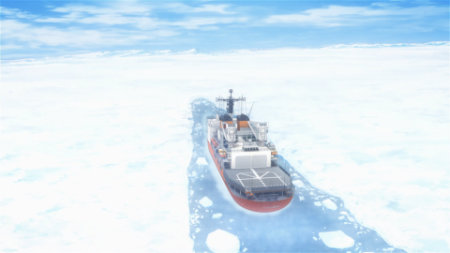 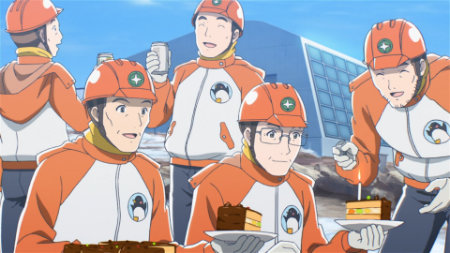 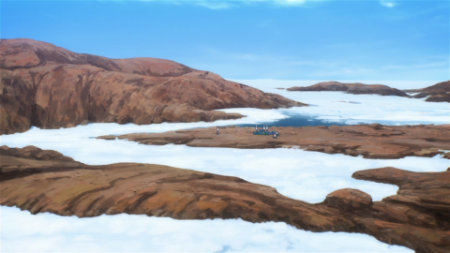 Stig: Shirase -- and by that extent, the entire show -- seems to run on this "in your face" mentality. It's a direct opposition to the statement "you can't do that", which is a good lesson to take in. The thing is, the show itself literally forces all the stars to align for her journey to come through. If Yuzuki wasn't there at all, and if the story somehow didn't call for a famous teenager to join the expedition, Shirase and Mari would have no leg to stand on. So, if Yuzuki wasn't there, Shirase wouldn't be able to go to Antarctica -- or at least not until she became an adult and chose to pursue that as a career -- you know, like Gin did. And Shirase's mom. That being said, as adults, we owe it to try our best to give teenagers the chance to experience as much of these things as is within our power. Even beyond Shirase's tragedy concerning her mom, A Place Further Than The Universe is simply a delightful trivia-laden journey to one of the most inhospitable areas on our planet. The show could have lived on that alone, but it's also one of the best examples of the scales of humanity, warts and all. Allen: ALL the girls were allowed to shine in some way, even if Shirase is the prime mover here. As I said earlier, the journey is every bit as fascinating as the destination- maybe even MORE so. A solid 5 stars from me too. An absolutely fantastic journey into the frozen hellscape of adulthood. That.... might not have come out right. Oh well... — Stig Høgset and Allen Moody Recommended Audience: There are some mild allusions to compensated dating (in the context that it's a terrible job regardless, but especially for clueless teenagers), which is as far as the show goes sexually. Other than that, there's little in the way of objectionable stuff, as the show is very upfront with its one character death. Version(s) Viewed: Digital stream on Crunchyroll, Japanese with English subs. Review Status: Full (13/13) A Place Further Than The Universe © 2018 AT-X, Madhouse, A Place Further Than the Universe Production Committee |
 |
|
| © 1996-2015 THEM Anime Reviews. All rights reserved. |